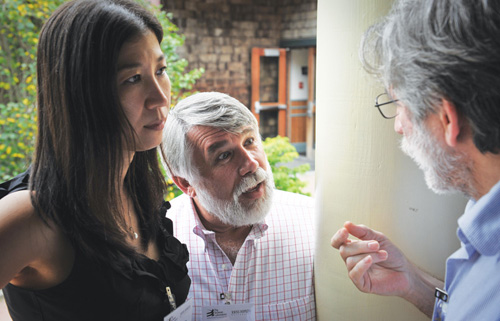 Photos courtesy of Young-Shin Kim.
Photos courtesy of Young-Shin Kim.
For the Children
Psychiatrist Young-Shin Kim talks about her headline-making autism study in South Korea and the stigma that still surrounds the disorder
by Rebecca U. Cho
A landmark study on autism conducted over six years in a middle-class South Korean suburb recorded the largest incidence of autism ever measured in a general population. Researchers found 2.6 percent of the children aged 7 to 12 in the Ilsan district of Korea showed symptoms of an Autism Spectrum Disorder (ASD), a rate that is more than twice what has been the estimated prevalence in the developing world. That is the equivalent of 1 in 38 children.
The headline-making findings, which suggest that autism in any population in the world is more common than previously thought, stunned autism experts when they were published this past spring and may improve the way the disorder is studied.
Leading the groundbreaking research was Young-Shin Kim, a Yale University researcher who is fighting to elevate the awareness of autism in South Korea, her native country, where a diagnosis of the developmental disorder is still considered shameful.
ASDs are complex neurobiological disorders that inhibit a person’s ability to communicate and develop social relationships, and can range in severity. In the U.S., there has been considerable public discussion about the disorder and high-profile campaigns to raise awareness of autism, but in Korea, parents often react to an ASD diagnosis like it’s a fatal blow, said Kim.
A Yonsei University-educated medical doctor, Kim left Korea for the U.S. in 1994 seeking training in child psychiatry research. Korea lacked the structure and funding for this level of training, as well as for meaningful research studies. Now, based at the Yale School of Medicine’s Child Study Center, where the 46-year-old serves as an assistant professor of psychiatry, Kim has been at the forefront of important studies affecting children. One of her other research projects involves investigating whether there is a connection between being bullied and suicide among children. Her interest in bullying arose during a visit several years ago to Korea, where she heard new slang terms for bullies and their victims. Kim often splits her time between the U.S. and South Korea, where she not only conducts research, but, as with the autism issue, also goes a step further. Knowing that the best outcomes for children with ASD come from the earliest possible diagnosis and intervention, she is currently working with South Korean school officials and the government to advance such initiatives. There has been some progress: Goyang City, where the district of Ilsan is located, has begun to provide assessment and intervention services for all first-graders entering the school system.
But, despite such promise, Kim says roadblocks remain in a country where the general population and government largely ignore the condition.
The professor spoke with KoreAm about what led to her interest in childhood psychiatry and the impact she hopes to make with her research.
Did you always want to be a doctor?
[As a child] I was pretty weak and went to the hospital often. I hated doctors [because] they poked me with needles. Originally, I wanted to be a nurse. Then my mother asked me why I wanted to be nurse. I told her because they’re helping sick kids. And my mother told me actually doctors do more things to help sick kids than nurses. She was very convincing. [But] I had never seen a woman doctor then. It was the 1960s and 1970s. I asked my mom, “Is it really possible—a girl doctor? My mom convinced me, and since then I wanted to become a doctor to help sick kids. That became my dream.
I’m the first doctor in my family.
How did you come to translate your desire to help children into psychiatry?
When I did a rotation in child psychiatry, … I saw a lot of kids who were suffering. It was not physical pain, but psychologically, they were suffering. I wanted to do something for those children.
A few years after graduating from Yonsei University in 1988, you came to the Yale University School of Medicine to obtain a master’s in public health in epidemiology. Why make the move to the U.S.?

In my fourth year [of medical school], I made up my mind to be a child psychiatrist. There was one program in Korea, and it was mediocre and was one year. I didn’t want to do it for just one year. I wanted full training. That’s how I ended up coming to Yale in 1994.
What kind of impact do you hope to make in Korea?
I’m interested in children everywhere, but I’m most interested in Korean children because I’m Korean. The other thing is, even though Korea economically is a successful country, money spent on research is so nominal, so small. I wanted to do some good research on Korean children, so the Korean government and parents could use that data to improve their children’s lives and well-being. That’s the kind of [motive] I had in terms of my heart.
What did your study on autism show?
This is the most thorough, comprehensive prevalence study done on autism. In the past, what people did to estimate the prevalence of Autism Spectrum Disorder was [look at] the records and figure out how many kids there were with a diagnosis of ASD or some symptom of ASD or, at best, before our study, some people would go to special education schools and screen the children and make a diagnosis. But that means if a child with ASD didn’t go to a [special program], then they’re not going to get counted. It’s an underestimate for sure. We not only looked at kids on record [as having ASD] and at special education schools, but we went to regular schools and screened every kid. We found a lot of kids there with ASD.
Why did you choose a population in South Korea for the study?
Scientifically, Korea is a very interesting population because genetically it’s very homogeneous, not like the American population, which is so big [and where] the whole population is so mixed. If we find anything, we don’t know if it’s because of genetics or different cultures or different people. [Also] the Korean educational system is pretty decent. Every kid in Korea goes to school. There is not much homeschooling or alternative schools. If you want to do some study on a big population or general population, you can go to the school and pretty much find every kid.
Did you find ready participants in the parents in the Ilsan district?
At the beginning, parents and teachers were pretty unsure. They questioned, what was this about? But one or two years later, they began to understand it’s helping their children. They’re learning about their [children’s] social capacity.
How did parents in this study react upon hearing that their children were autistic?
Sometimes they get really upset. They sometimes couldn’t accept it. But later on they understand their children had suffered, and that’s why they scored high in their screenings. Some right away say, “It makes sense. My child was suffering, and now I know why. What can we do to help my child?” From the bottom of their hearts, they know something is not right, but when they get the diagnosis, some are very angry at us.
During your research, you stepped above and beyond and helped secure funding to create the Goyang Sound School project, an early identification and intervention program for autism.
This is an exemplary case where you do the research and then the community takes the initiative and builds something, and it becomes more of a project that can help children directly. With this project, the public awareness of ASD in that area has [grown] incredibly. Having this kind of funding, we’re not just giving [children] a diagnosis, but giving them intervention programs supported by the city. That was really a great victory not only for ASD, but we expanded it to general mental health problems like anxiety, depression and attention deficit hyperactivity disorder.
Even with the rise in public awareness, how do South Korean parents tend to react to a diagnosis of autism for their child?
Still, [to many parents] ASD is like a death sentence. If you have autism, your child is finished. It’s not true. There are things you can do to make children grow and function much better and become a productive member of the community. That needs to be addressed.
How can these attitudes in South Korea change?
My frustration in Korea is people don’t come out and say, “My child has autism.” Society needs to change and government needs to provide funding and everyone needs to learn, in general, how to live with children with disabilities or handicaps.
This article was published in the July 2011 issue of KoreAm.









